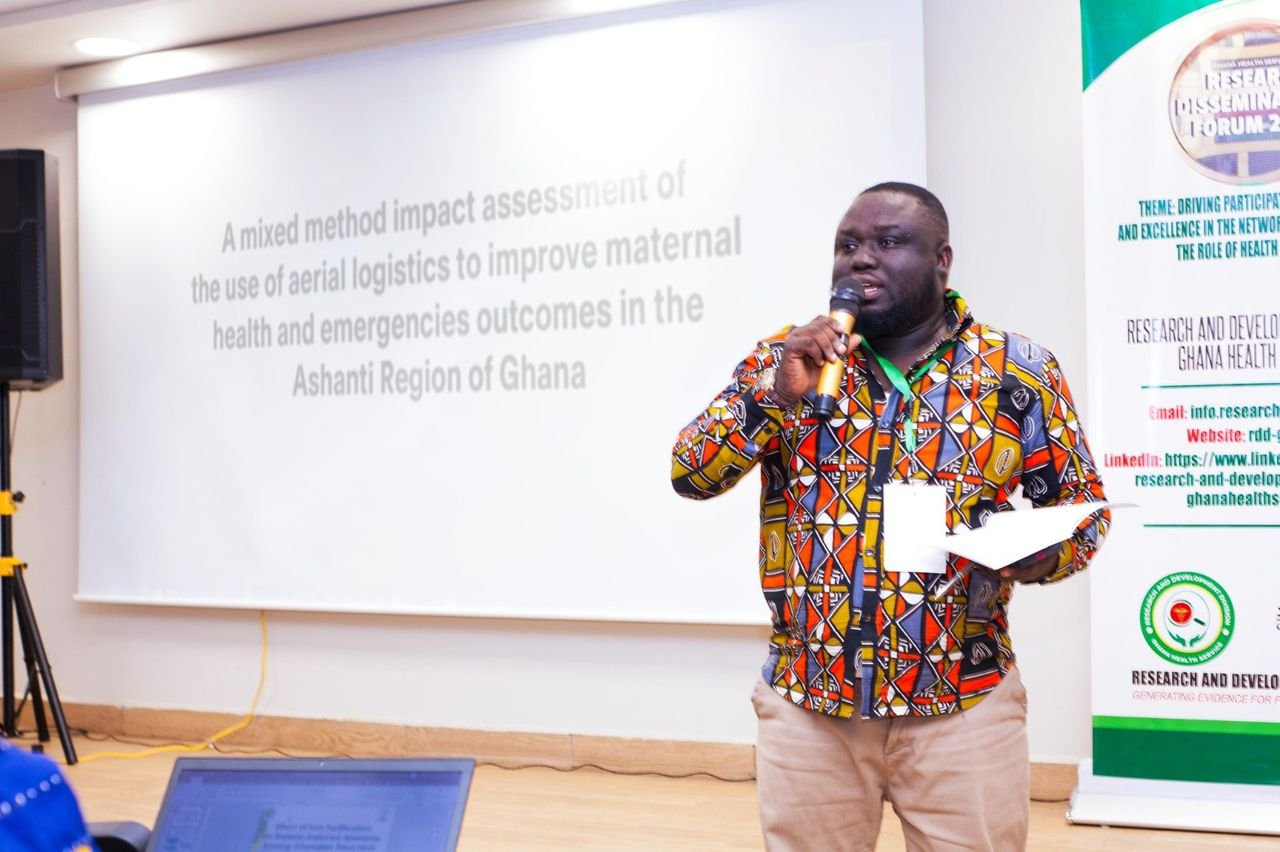Hot!
Zipline, GHS reduce maternal mortality in Ashanti Region by 56.4% – Study

A recent impact assessment study on aerial logistics to improve maternal health and emergencies has revealed a remarkable reduction in maternal mortality by 56.4% in Ghana’s Ashanti Region, thanks to the collaborative efforts of Zipline and the Ghana Health Service (GHS).
This was revealed at the National Ghana Health Service Research Conference organized by the Ghana Health Service in partnership with Zipline. The study, which focused on the impact of aerial logistics in healthcare, also noted a 19.9% increase in antenatal visits and a 25% rise in in-facility births, signaling a significant boost in maternal health outcomes.
The success according to the study is attributed to the on-demand availability of blood and essential medical supplies provided by Zipline’s innovative drone delivery system. This consistent access to critical resources has increased patient confidence in the healthcare system, encouraging more mothers to seek necessary care throughout their pregnancies.
Speaking on the highlight of the study, the Research Officer at Ashanti Regional Health Directorate stated, “the significant decrease in maternal mortality we’ve seen is a clear indication of the vital role that reliable access to medical supplies plays in healthcare. The ability to deliver blood and essential medicines exactly when they’re needed has transformed how mothers in the Ashanti Region perceive and engage with the healthcare system.”
“It’s an achievement that speaks to the importance of introducing technology in healthcare delivery. Mothers now feel more confident in seeking care, knowing that they will receive the support they need throughout their pregnancies,”he stated.
The study examined data from 191 health facilities, including hospitals, health centers, and Community-based Health and Planning Services (CHPS) Compounds. Among these, 99 facilities were served by Zipline’s aerial logistics, while 91 were not. The research employed adjusted rates for various key indicators, such as antenatal consultations, emergency visits, referrals, live births, hysterectomies, maternal deaths, and neonatal deaths, as the main dependent variables.
The qualitative aspect of the study aimed to describe and analyze the changes in satisfaction levels among healthcare providers and patients, perceived quality of care in maternal health and emergencies, and experiences related to the use of aerial logistics. In-depth interviews were conducted with 22 patients and 23 healthcare providers at the participating facilities.
Globally, maternal mortality remains a critical public health challenge, with stark disparities between high-income and low-to-middle-income countries (LMICs).
According to the World Health Organization (WHO), the majority of maternal deaths occur in LMICs, often due to preventable causes. In Ghana, particularly in the Ashanti Region, the problem is critical, reflecting the broader challenges faced across the African continent. Beyond this, socio-economic, geographic, and infrastructural factors intensify the risks associated with pregnancy and childbirth, highlighting the urgent need for innovative solutions to improve maternal health outcomes.
As maternal mortality continues to pose a challenge in low-to-middle-income countries, the success seen in Ghana’s Ashanti Region offers a promising model for other regions and nations striving to improve maternal health outcomes through innovative solutions.
Zipline is poised to continue leading the way in revolutionizing healthcare delivery, ensuring that every mother has access to the life-saving resources, no matter where she lives.
Hot!
Education free, but parents have roles to play – Anloga DCE

Madam Sandra Seyram Kpedor, the District Chief Executive (DCE) of Anloga in the Volta Region, has emphasised the importance of parental involvement in children’s education, stating that education is free, but parents need to do more to support their children.
She said parents, teachers, and students must be involved in addressing the challenges facing the district’s education sector, particularly the poor Basic Education Certificate Examination (BECE) results.
Madam Kpedor outlined some key roles parents should play to promote their children’s education, including providing a conducive learning environment, monitoring their children’s progress, and supporting teachers.
The DCE highlighted some challenges the district faced such as inadequate infrastructure and a shortage of teachers, which have also contributed to the poor BECE results and called on well-to-do parent to help solve the situation through and other supports.
To address the issues, she also announced that plans have been taken to utilise the district’s common fund to implement educational projects, such as constructing school blocks and teachers’ bungalows at Sodzi community, and 2-unit classroom blocks each at Akplorwutorkor and Tegbi-Afedome respectively, among others.
Madam Kpedor also noted that her office had earlier notified the Ministry of Education to deploy more teachers to the area to improve teaching and learning, and encouraged students to work hard and strive for excellence, and work beyond their limit to succeed.
“To my wonderful and beautiful girls, you have to know it clear that women and girls have equal opportunities to compete with men for greater achievements,” she indicated.
The DCE cited her own achievement as a testament to the fact that women can excel in leadership positions, alongside Vice President Nana Jane Opoku-Agyemang, and stressed that girls were no longer limited to domestic roles but can pursue their dreams and become leaders.
Additionally, she mentioned that a meeting was held earlier with assembly members, and other stakeholders to address the district’s educational challenges and improve academic performance.
She promised that the district’s education oversight committee and stakeholders would work together to address the challenges and improve the district’s BECE results and called for parental involvement and support to boost the district’s education sector for children to chase their dreams to become future leaders for the success of the district and the nation.
She urged parents not to leave everything to the government but rather help in the provision of some necessary materials such as textbooks, exercise books, pens, pencils, food, and guidance to children for the successes of young learners. –GNA
Join our WhatsApp Channel now!
https://whatsapp.com/channel/0029VbBElzjInlqHhl1aTU27
Hot!
Dennis Miracles Aboagye criticises NDC’s “no fee stress policy” implementation

The spokesperson for Dr. Bawumia, Dennis Miracles Aboagye, has criticised the implementation of the NDC government’s No Fee Stress policy, arguing that the programme has failed to deliver on its core promise.
According to him on Starr fm, the policy, which was introduced to ensure stress free payment of fees for level 100 tertiary students, has rather turned into what he described as post stress support.
He explained that students are required to pay their fees first before applying for reimbursement, a situation he believes defeats the purpose of the policy.
He questioned claims by government officials that the policy has been successful and that citizens are happy.
In his view, such claims do not reflect the lived realities of many Ghanaians. He stressed that while some people may appear satisfied, many others continue to struggle.
Dennis Miracles Aboagye pointed to the situation of trained teachers and nurses who have been picketing for nearly six months, demanding employment.
He noted that government responses suggesting it cannot accommodate all of them contradict claims of economic stability.
He further argued that economic indicators such as a stable currency mean little to people who are unable to secure jobs or access promised support.
He observed that telling an unemployed teacher or a struggling student that the cedi has strengthened does not address their immediate challenges.
On the issue of tertiary education, he maintained that no level 100 student benefited from stress free fees in 2025, despite the policy being announced.
He added that in 2026, students have already reported to school without receiving the promised support.
He insisted that asking students to pay fees first and seek reimbursement later amounts to support after hardship, not stress free education.
According to him, this approach goes against what was promised during the policy announcement.
Dennis Miracles Aboagye questioned why a government that presents the economy as strong is unable to fulfil what he described as simple and clear promises.
He added that there is a fundamental problem with the way the economy is being managed and indicated that he is prepared to explain his position further.
By: Jacob Aggrey







